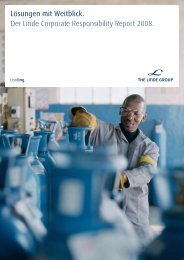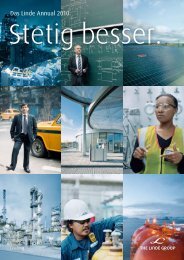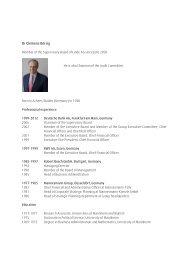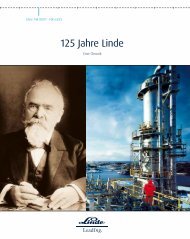The complete history of the development of The - The Linde Group
The complete history of the development of The - The Linde Group
The complete history of the development of The - The Linde Group
You also want an ePaper? Increase the reach of your titles
YUMPU automatically turns print PDFs into web optimized ePapers that Google loves.
Dr.-Ing. Richard <strong>Linde</strong> at <strong>the</strong> age <strong>of</strong> 53 (1929).<br />
Carl von <strong>Linde</strong>’s second son studied<br />
mechanical engineering at <strong>the</strong> Technical<br />
University in Munich until 1900 and<br />
received a Doctorate in technical sciences<br />
at <strong>the</strong> Laboratory for Technical Physics at<br />
TU Munich. After working at Maschinenfabrik<br />
Augsburg Nürnberg (MAN) for<br />
about two years, he took a position in<br />
Department B at <strong>Linde</strong> in Höllriegelskreuth.<br />
<strong>The</strong>re he worked at first with his fa<strong>the</strong>r<br />
on <strong>the</strong> <strong>development</strong> <strong>of</strong> equipment for air<br />
liquefaction and gas separation. In <strong>the</strong><br />
beginning still with his bro<strong>the</strong>r-in-law<br />
Rudolf Wucherer and later with various<br />
different employees, he was successful<br />
in developing many new separating<br />
processes and rectification columns.<br />
In 1914 he received power <strong>of</strong> attorney<br />
and responsibility for facilities engineering<br />
as well as all business to do with<br />
supplying gas liquefaction and separation<br />
plants, which required <strong>the</strong> highest level<br />
<strong>of</strong> commitment, especially during <strong>the</strong><br />
46<br />
1945 1946<br />
Unconditional surrender by Germany. Beginning <strong>of</strong> <strong>the</strong> Nuremberg War Crimes Trials.<br />
Dr.-Ing. Richard <strong>Linde</strong> (1876–1961)<br />
war period. In 1928 Richard <strong>Linde</strong> was<br />
appointed to <strong>the</strong> Executive Board and<br />
remained <strong>the</strong> top developer and engineer<br />
in Department B until 1949.<br />
Richard <strong>Linde</strong> lost three <strong>of</strong> his five<br />
sons during <strong>the</strong> Nazi period. <strong>The</strong> oldest,<br />
Helmut, and <strong>the</strong> second oldest, Werner,<br />
had both worked for <strong>the</strong> <strong>Linde</strong> Company<br />
after receiving <strong>the</strong>ir Doctoral degrees.<br />
<strong>The</strong> third son Gustav committed suicide<br />
in 1935 at <strong>the</strong> family’s summer home in<br />
Berchtesgaden. Dr. Hermann <strong>Linde</strong>, who<br />
began working for <strong>the</strong> company in 1948,<br />
was appointed to <strong>the</strong> Executive Board in<br />
1961 and acted as its speaker from 1972-<br />
76. <strong>The</strong> youngest son Gerhard worked<br />
as sales manager for <strong>Linde</strong> in Höllriegelskreuth.<br />
Richard <strong>Linde</strong> changed to <strong>the</strong> company’s<br />
Supervisory Board in 1949 and stepped<br />
down in 1955. He died on January 16,<br />
1961 in Munich.<br />
Borchardt returned to Höllriegelskreuth in 1946 and resumed<br />
his position from before 1938 as technical director with power<br />
<strong>of</strong> attorney for negotiations and contracts abroad. Pollitzer, however,<br />
was taken into custody by <strong>the</strong> Gestapo in Paris in 1940<br />
and in 1942 was murdered in <strong>the</strong> Auschwitz concentration camp.<br />
Otto Hippenmeyer, a Member <strong>of</strong> <strong>the</strong> Executive Board <strong>of</strong> <strong>the</strong><br />
<strong>Linde</strong> Company since 1929, was assisted by both <strong>the</strong> <strong>Linde</strong> family<br />
and <strong>the</strong> <strong>Linde</strong> Company and as a “half-Jew” managed to survive<br />
in Germany.<br />
War and collapse<br />
Although <strong>Linde</strong> did not supply arms products in <strong>the</strong> narrower<br />
sense, all <strong>of</strong> its departments were never<strong>the</strong>less connected with<br />
arms production. <strong>The</strong> oxygen plants supplied <strong>the</strong> Luftwaffe, and<br />
<strong>Linde</strong> was also involved in <strong>the</strong> rocket program (V1/V2) by way<br />
<strong>of</strong> <strong>the</strong> “Heylandt-Gesellschaft für Apparatebau” in Berlin. <strong>The</strong><br />
refrigerated case plant in Mainz-Kos<strong>the</strong>im built mobile repair<br />
shops and <strong>complete</strong> repair trains for MATRA during <strong>the</strong> war.<br />
<strong>The</strong> Güldner plant group also manufactured such products as<br />
cylinder boring machines and hydraulic presses for MATRA. Later<br />
Güldner also sold engines with wood carburetors for tractors, etc.<br />
During <strong>the</strong> war, Ellira (Elektro-<strong>Linde</strong>-Rapidschweißung), <strong>the</strong><br />
electric welding systems department established in Höllriegelskreuth<br />
in 1937, worked almost exclusively on supplying welding<br />
equipment for <strong>the</strong> arms industry.<br />
One <strong>of</strong> <strong>the</strong> darkest chapters in <strong>Linde</strong>’s <strong>history</strong> was certainly<br />
<strong>the</strong> company’s involvement in <strong>the</strong> construction <strong>of</strong> production<br />
facilities for IG Farben surrounding <strong>the</strong> Auschwitz concentration<br />
camp. <strong>The</strong> Merseburg GmbH ammonia plant, owned by IG Farben,<br />
built a syn<strong>the</strong>tic rubber factory <strong>the</strong>re using prisoners at <strong>the</strong><br />
Auschwitz II satellite concentration camp in spring 1941 for<br />
which <strong>Linde</strong> built and installed four oxygen and two helium<br />
plants. Two more plants ordered for Auschwitz could not be<br />
produced due to <strong>the</strong> war.



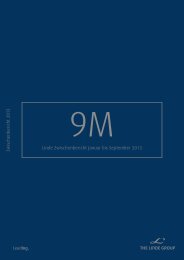
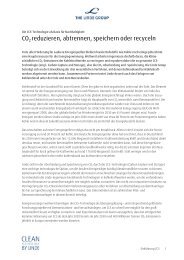
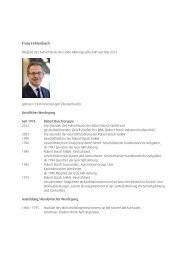
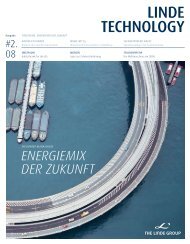
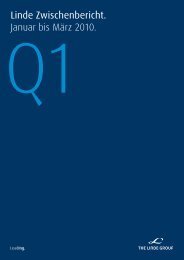
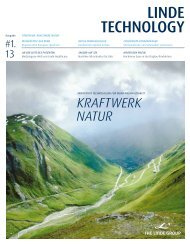

![[41] Anteilsbesitzliste des Linde Konzerns und ... - The Linde Group](https://img.yumpu.com/8356102/1/184x260/41-anteilsbesitzliste-des-linde-konzerns-und-the-linde-group.jpg?quality=85)
![[41] Anteilsbesitzliste des Linde Konzerns und ... - The Linde Group](https://img.yumpu.com/8356076/1/184x260/41-anteilsbesitzliste-des-linde-konzerns-und-the-linde-group.jpg?quality=85)
